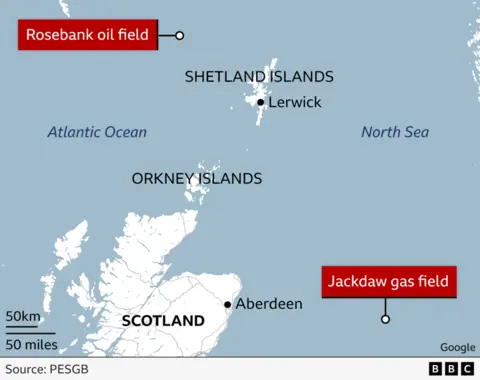A Scottish court has determined that the consent for two new oil and gas fields in the North Sea was granted unlawfully. This ruling comes after a legal challenge led by environmental organizations, Uplift and Greenpeace, which took the case to the Court of Session in Edinburgh. The decision affects the Rosebank and Jackdaw fields, two significant energy projects in the UK’s offshore sector.
In a detailed 57-page judgment, Lord Ericht, the presiding judge, stated that the environmental impact assessments conducted for the Rosebank and Jackdaw fields had been insufficient. The core issue, according to the judgment, was the failure to consider the environmental impact of “downstream emissions,” which refers to the greenhouse gases released when the fossil fuels extracted from these fields are burned. This consideration is critical for assessing the full climate impact of the projects, in light of the UK’s commitment to reducing carbon emissions and meeting international climate targets.
As a result of the ruling, work on both fields can continue, but no oil or gas can be extracted unless the developers seek and obtain fresh approval from the UK government. This ruling reinforces the importance of up-to-date environmental assessments that account for the full lifecycle emissions of fossil fuel projects, not just the emissions generated during extraction.

Shell’s Jackdaw gas field and the Rosebank oil field are two of the most prominent energy projects in the North Sea. The Rosebank field, located 80 miles west of Shetland in the North Atlantic, is considered the largest untapped oil field in UK waters, with an estimated 300 to 500 million barrels of oil. The Jackdaw gas field, on the other hand, was originally approved in 2022 and is expected to produce natural gas to meet domestic demand. Both fields had previously been granted permission by the UK government and the industry regulator, but the legal challenge focused on the inadequacy of environmental reviews.
The ruling has sparked debates between environmental campaigners, who argue that further exploration of oil and gas fields is incompatible with climate goals, and the oil companies, which assert that such projects are vital for maintaining energy security in the UK. While companies like Shell and Equinor have insisted that the fields are crucial for the UK’s energy mix, environmental groups have welcomed the judgment as a necessary step in holding energy projects accountable for their climate impacts.
The ruling has significant implications for future energy projects in the UK. It highlights the need for more comprehensive environmental impact assessments that take into account the full lifecycle of emissions from fossil fuel projects. The case also underscores the evolving nature of climate law and its increasing focus on the broader environmental impacts of energy production.

The judgment also sets a precedent for how the UK government must approach future approvals for oil and gas projects, ensuring that all relevant environmental factors are considered. The case could influence the future of the UK’s energy policy, especially as the government continues to grapple with its climate commitments while balancing energy security and economic growth.
Following the court ruling, Shell and Equinor have expressed their commitment to continuing work on the Jackdaw and Rosebank fields, though both companies will need to secure new approvals before they can proceed with full-scale extraction. Shell emphasized that the project is important for UK energy security and job creation, while Equinor stated that the Rosebank project is vital for the UK’s economic growth.
Environmental groups, however, remain firm in their opposition, urging the government to reject future approvals for new oil and gas fields. They argue that continuing to expand fossil fuel extraction is incompatible with meeting global climate goals.
As the UK government now reassesses the consent for both projects, the outcome will be crucial in shaping the country’s approach to energy production and climate responsibility in the coming years.

This case is part of a broader global conversation about the future of fossil fuel extraction amid the intensifying climate crisis. As governments worldwide face mounting pressure to reduce carbon emissions, decisions like the one in Scotland will have far-reaching consequences. The UK’s response to this case could influence the regulatory landscape for energy projects and impact its ability to meet international climate targets.
Stay ahead with the latest news on global innovation, leadership, entrepreneurship, business, and tech. Join us on WhatsApp or Telegram for real-time updates. Have a report or article? Send it to report@theinnovationtimes.com.
Follow us on X (Twitter), Instagram, LinkedIn, Pinterest, and Facebook for more insights and trends.


